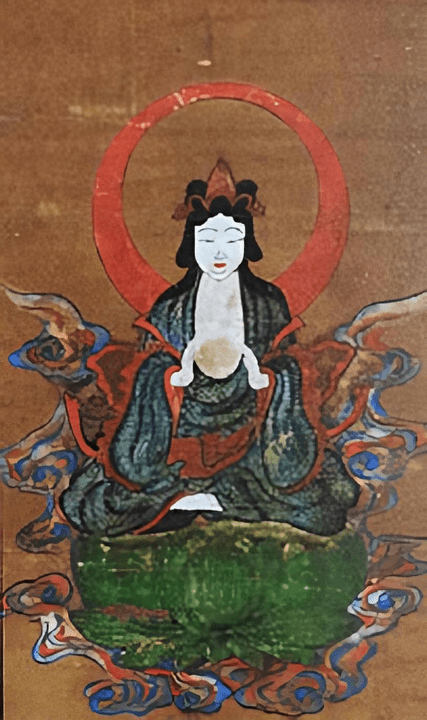
Table of Contents
The Shinto kami god Tsukuyomi, also called Tsukuyomi-no-Mikoto, is one of the very few male moon deities in the world. Some of the other male moon gods include the Hindu god Chandra, the Norse god Mani, and the Egyptian god Khonsu, but the vast majority of moon deities in the world’s religions are female.
What truly sets Tsukuyomi apart, however, is that he’s the only male moon god to also be a prominent figure in his religion’s pantheon, as he was the former consort-king of Heaven in Shintoism.
Who is Tsukuyomi?

Tsukuyomi is one of the three first children of the male creator kami Izanagi. After Izanagi left his dead wife Izanami locked in the Shinto Underworld Yomi, he purified himself in a spring and accidentally gave birth to three children. The sun goddess Amaterasu was born from Izanagi’s left eye, the moon god Tsukuyomi was born from his father’s right eye, and the sea and storm god Susanoo was born from Izanagi’s nose.
After his first childbirth, Izanagi decided that his three first-born children would rule the Shinto Heaven. He set up Amaterasu and Tsukuyomi as the ruling couple after they married, and he appointed Susanoo as Heaven’s guardian.
Little did Izanagi know, however, that his children’s marriage wouldn’t last long.
Killing for the Sake of Etiquette
Tsukuyomi is best-known as a stickler for the rules of etiquette. The moon kami is viewed as the traditional Japanese conservative male who always looks to maintain and enforce order. As the King of Heaven, Tsukuyomi took this very seriously and even went so far as to kill a fellow kami for not adhering to good etiquette. Apparently, the fact that killing someone is a “breach of etiquette” didn’t bother the moon kami.
The unfortunate victim of Tsukuyomi’s wrath was Uke Mochi, the female kami of food and feasts. The incident happened at one of her traditional feasts to which she had invited Tsukuyomi and his wife, Amaterasu. The sun goddess was indisposed, however, so her husband went alone.
Once at the feast, Tsukuyomi was horrified to see that Uke Mochi didn’t adhere to any of the traditional food-serving etiquette. On the contrary, the way she served food to her guests was positively repulsive – she spat rice, deer, and fish from her mouth into her guests’ plates, and pulled even more dishes from her other orifices. This enraged Tsukuyomi so much that he killed the food kami on the spot.
When his wife, Amaterasu, found out about the murder, however, she was so horrified with her husband that she divorced him and banned him from returning to her in Heaven.
Chasing the Sun
The divorce between Amaterasu and Tsukuyomi is the Shinto explanation for why the sun and the moon are always “chasing” each other across the sky – Tsukuyomi is trying to return to his wife in Heaven but she won’t have him back. Even solar eclipses where the sun and moon seem joined are still viewed as a near-miss – Tsukuyomi almost manages to catch up to his wife but she slips away and runs from him again.
Moon-Reading
Tsukuyomi’s name literally translates as Moon-reading or Reading the Moon. The kami is also sometimes referred to as Tsukuyomi-no-Mikoto or The Great God Tsukuyomi. His hieroglyphic Kanji symbol can also be pronounced as Tsukuyo which means moon-light and Mi which is watching.
All this refers to the popular practice of moon-reading. In Japan’s aristocrat courts, the noble lords and ladies would often gather in the evening and read poetry while gazing at the moon. As proper etiquette was always viewed as highly important at these gatherings, Tsukuyomi was a very revered deity.
Symbols and Symbolism of Tsukuyomi
Tsukuyomi symbolizes the moon in many ways. For one, he’s described as being beautiful and fair, just like most moon goddesses in other religions. Tsukuyomi is also cold and strict, however, which fits very well with the moon’s pale-blueish light. He runs across the sky chaotically, both during the night and day, chasing the sun, never able to catch it.
Most importantly, however, Tsukuyomi symbolizes the aristocratic etiquette of Japan’s noble courts. Strict followers of the rules of etiquette, Japan’s lords and ladies would also often adhere to the rule of etiquette with a deadly resolution while moon-reading at night.
Like most Shinto kami, Tsukuyomi is viewed as a morally-ambiguous character. Many view him as an “evil” kami which is what his ex-wife Amaretasu also dubbed him. At the same time, however, many still worship and revere him. Tsukuyomi has many temples and shrines across Japan to this day.
Importance of Tsukuyomi in Modern Culture
Even though he is not the most popular kami in Japanese culture, Tsukuyomi still appears in much of Japan’s modern culture – after all, he is the former king of Heaven.
Tsukuyomi’s most notable appearances are not exactly as himself, however, but more as name-drops.
- Tsukuyomi is the name of a fighting technique of the Sharingan ninjas in the popular anime Naruto. Naturally, the technique stands to the opposite of another skill called Amaterasu.
- In the Chou Super Robot Wars anime, Tsukuyomi is both a god and the name of a mecha robot created by the deity’s worshippers.
- In the video game Final Fantasy XIV, Tsukuyomi is portrayed as a moon boss that the player has to overcome but, funnily enough, he’s portrayed as female.
- There’s also the Tsukuyomi: Moon Phase anime that’s named after the moon kami even though it has nothing to do with him or his story.
Tsukuyomi Facts
Tsukuyomi is the god of the moon. This is quite unusual as most moon deities in most cultures tend to be female.
Tsukuyomi marries his sister Amaterasu, the sun goddess. Their marriage represents the relationship between the sun and the moon.
Tsukuyomi was born in miraculous circumstances, from the right eye of Izanagi.
Tsukuyomi’s son is Ama-no-Oshihomimi who is significant because it’s this son who becomes the first emperor of Japan. However, this isn’t a highly common perspective.
Tsukuyomi symbolizes the moon, thereby representing serenity, calmness, order and etiquette.
Tsukuyomi is often viewed as a negative figure in Japanese mythology. Even his own wife, who is among the most revered of all Japanese deities, banished him from heaven and looks on him with disdain.
Wrapping Up
Tsukuyomi as a male lunar deity is an intriguing figure. He is a rigid and particular deity, whose behavior is often contradictory, demonstrating calmness, ferociousness, capriciousness and order, to name a few. His enduring love for his wife and his continual pursuit to win her back paint him in a softer light, even though his position in Japanese mythology is somewhat negative.








